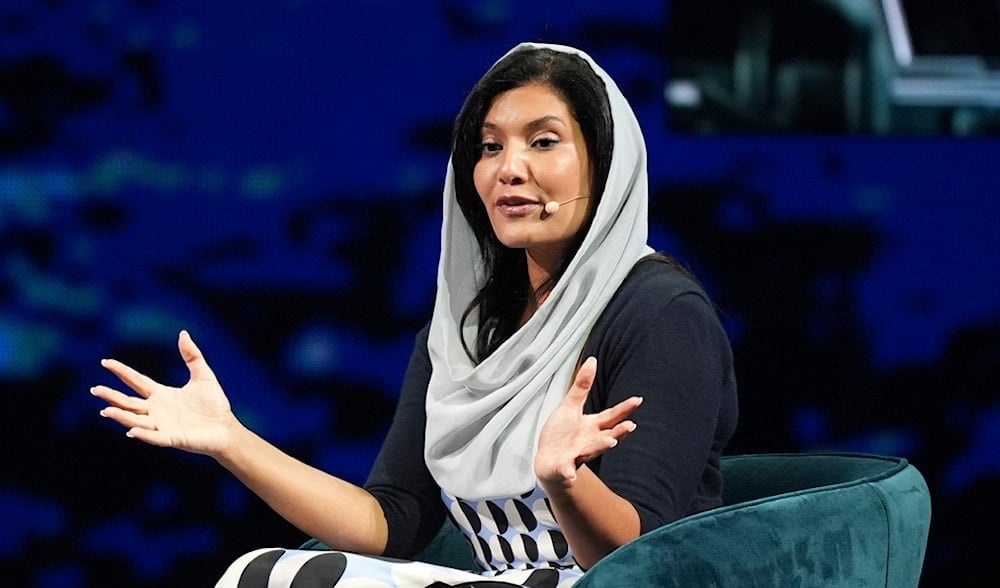Saudi Arabia's new goal: Becoming an AI hub to support US tech
Saudi Arabia seeks an AI partnership with the US, aiming to support and extend the American tech ecosystem, as bilateral ties shift toward innovation and business.
-

Reema Bandar Al-Saud, Saudi Arabian ambassador to the U.S., speaks at the America Business Forum, Wednesday, Nov. 5, 2025, in Miami. (AP)
Saudi Arabia is seeking to deepen its collaboration with the United States in the field of artificial intelligence, with ambitions to become an extension of the US technology ecosystem, according to Saudi Ambassador to Washington, Princess Reema Bandar Al-Saud.
Speaking at the America Business Forum in Miami, Princess Reema stated, “In AI, what we're looking for is collaboration. We would like to be the extension of the United States ecosystem, not as a standalone.”
The Saudi official emphasized that the Kingdom views artificial intelligence as central to its future growth, particularly in fields such as healthcare, energy, and scientific research. She highlighted potential breakthroughs in stem cell therapy, cancer treatment, and genetic disease research, noting that such advances depend heavily on computing power and infrastructure.
The ambassador pointed to Saudi Arabia’s strategic assets, including affordable land, energy resources, and a skilled workforce, as advantages that position it as a viable and valuable partner for the United States in AI development.
That comes as the US risk of an AI bubble is rising sharply: inflated valuations, massive infrastructure spending, and unproven revenue models all point to a boom built more on hype than results. If the promised productivity gains don’t materialize, the fallout could hit broader markets, create sharp corrections, and expose weaknesses in innovation ecosystems.
Supporting US technology ecosystem
She stressed that Riyadh does not seek to compete with the United States, but to support and complement its technological ecosystem, ensuring sustained growth and innovation on both sides.
This aligns with recent remarks made by former US President Donald Trump, who warned that electricity production must triple to sustain AI infrastructure, while asserting that the United States remains far ahead of other nations, including China, in the AI race.
The Saudi-US relationship is undergoing a significant transformation, moving beyond its traditional foundation of energy and defense to focus on technology, innovation, and economic cooperation, Ambassador Reema Bandar Al-Saud also stated at the forum.
“The Saudi-US relationship, I would tell you today, is the strongest it's ever been,” she noted. “Today, it's built on technology. It's built on innovation. It's built on relationships. It's built on business.”
Princess Reema expressed pride in the enduring relationship between the two nations and highlighted what she called a “unique moment” in which Saudi Crown Prince Mohammed bin Salman and the US leadership are working toward a peaceful and business-friendly global environment.
US arms to Israeli regime didn’t stop Riyadh from fueling the US Economy
Despite the Gaza Strip war and massive U.S. military backing for "Israel", over $16 billion in direct assistance in just one year, Saudi Arabia has shown no hesitation in deepening its relationship with the US by committing to a record-setting arms and investment package.
Riyadh’s approach underscores a transactional strategy: the kingdom isn’t deterred by the humanitarian fallout in Gaza from U.S. actions but rather uses the situation to reinforce its value as a critical US partner in defense, AI, and economic development.
With a pledged $600 billion investment package, of which $142 billion is allocated for US defense, the White House and Saudi Arabia essentially channel their participation in the US-Israeli military axis into powering the American economy, reinforcing Washington’s defense-industrial base while advancing its own high-tech and infrastructure agenda.
Saudi Arabia bets big on AI
Currently, Saudi Arabia is preparing a significant shift in the focus of its $925 billion Public Investment Fund (PIF), moving away from the real estate-driven Vision 2030 projects that have dominated its development agenda over the past decade.
The PIF strategy shift reflects a growing interest in artificial intelligence and data infrastructure. At the Future Investment Initiative (FII) forum this week in Riyadh, AI dominated the agenda, with robotic technology and digital city models on full display.
Saudi-owned Humain, a PIF-backed AI firm, announced plans to build around 6 gigawatts of data center capacity, powered by the kingdom’s energy resources. "Let’s just put it this way, everything we ask for, we get," said Humain CEO Tareq Amin, when asked about funding.
Read more: NEOM: A weird desert dream that might never come true

 4 Min Read
4 Min Read










